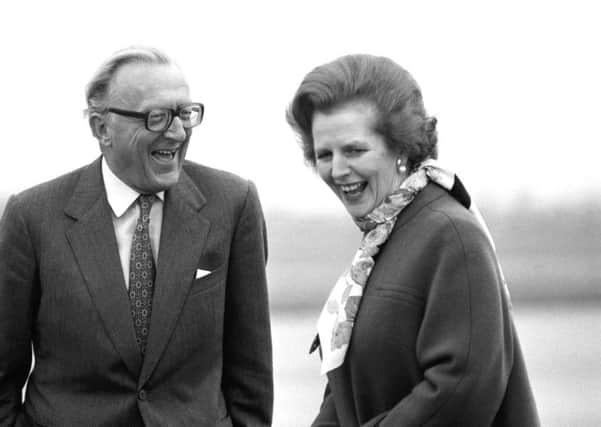Tom Richmond: Lord Carrington and the lost age of political dignity


The reason? The man who served every Tory premier from Winston Churchill to Margaret Thatcher did so from the House of Lords because of his status as a hereditary peer.
And, while Peter Mandelson and Andrew Adonis were peers who held down high-profile jobs in Gordon Brown’s government, Cabinet ministers should be scrutinised, and held to account, by democratically-elected MPs.
Advertisement
Hide AdAdvertisement
Hide AdHowever it was an irony of timing that Lord Carrington died on Monday. He was the last Foreign Secretary to resign before Boris Johnson’s vitriolic departure in the wake of David Davis’s resignation as Brexit Secretary.
Even more coincidentally, the last time two Cabinet ministers quit on a single day over a political crisis was in 1982 when Lord Carrington – and his deputy Humphrey Atkins – both resigned over Argentina’s invasion of the Falklands.
And here the comparisons end. As Tory grandee Ken Clarke observed, Lord Carrington was a “serious grown-up politician of the kind needed now” before contrasting his one-time colleague’s dignity – and respect of high office – with the “childlike” behaviour of many of today’s politicians.
Like so many of his generation, Lord Carrington’s approach to politics was shaped by the experiences and scars of the Second World War, where he was a tank commander in the Grenadier Guards.
Advertisement
Hide AdAdvertisement
Hide AdAs former premier Sir John Major observed: “In war and in peace, he served our country with courage, grace and distinction. He never fell beneath the dignity of his office, yet leavened public life with an irreverent wit that delighted all who worked with him.”
A statesman who also brokered the independence of Rhodesia, and then went on to head Nato as the Cold War ended, he will, nevertheless, always be remembered for his Falklands resignation when his warnings to the Cabinet about the possible consequences of the withdrawal of the patrol vessel HMS Endurance from the South Atlantic went unheeded,
“The nation feels there has been a disgrace,” he later wrote in his memoirs which were devoid of recrimination.
“Somebody must have been to blame. The disgrace must be purged. The person to purge it should be the minister in charge. That was me.”
Advertisement
Hide AdAdvertisement
Hide AdWhat a contrast with the undignified resignations of Messrs Davis and Johnson, two Brexiteers who did not have the guile, or statesmanship, to win a consensus on how best to implement their principles.
Instead the brooding presence of both on the backbenches will only intensify the pressure on Mrs May. Again contrast this with Lord Carrington’s example. When Mrs Thatcher was about to be toppled, I asked him for a comment on her premiership.
He declined very politely, saying he wanted to keep out of day-to-day domestic politics. Yet there was mutual respect. “We had disagreements but there were never any hard feelings,” she wrote in her autobiography.
When she started lecturing a foreign visitor in her usual forthright way, he famously interjected: “The poor chap’s come 600 miles. Do let him say something.” And when a journalist began a hypothetical question with these words “If Mrs Thatcher were run over by a bus...” he interrupted: “It wouldn’t dare.”
Advertisement
Hide AdAdvertisement
Hide AdAn honourable man, it shows how dishonourable politics has become when Lord Carrington’s resignation was, arguably, the last time that the once sacrosanct doctrine of Ministerial responsibility was observed.
And, because of the decline in integrity, public life is all the poorer as those who would previously have been deemed unfit for high office, like Boris Johnson, have not only done so but besmirched politics with tomfoolery that would sadden statesmen of Lord Carrington’s stature.
THREE points on this week’s reshuffle which have been overlooked in the Brexit maelstrom. First, all four ‘great offices of state’ are held by politicians – Theresa May, Philip Hammond, Sajid Javid and Jeremy Hunt – who all voted to remain in the EU. A nod to a softer Brexit?
Second there’s now just one Northern MP – Skipton and Ripon’s Julian Smith – in the Cabinet. Yet, as chief whip, pre-occupied with trying to hold the Tory party together, he has his hands full. All the more reason for the post of Northern Powerhouse Minister to be given Cabinet status.
Advertisement
Hide AdAdvertisement
Hide AdFinally Transport Secretary Chris Grayling has now survived six reshuffles since the election – presumably because there’s no one capable of doing a better job.
NETWORK Rail did not like my column last week about its refusal to answer Freedom of Information request after it emerged new trains being introduced on two busy commuter routes will be too long because plans to extend station platforms have been dropped.
Apologies in advance for the crude language, but this is how their missive started. “Have our route guys been pissing you off!?” emailed head of media Kevin Groves. Sorry, the state of the railways is no laughing matter here and Network Rail – and others – would discover this for themselves if they ventured out of their London comfort zone.
If, of course, the train gets them here. Perhaps a FOI is in order about the number of occasions Network Rail chiefs have visited Yorkshire in recent times – but the reply will either be late or ignored because this organisation does not keep up-to-date records or understand its public service requirements.